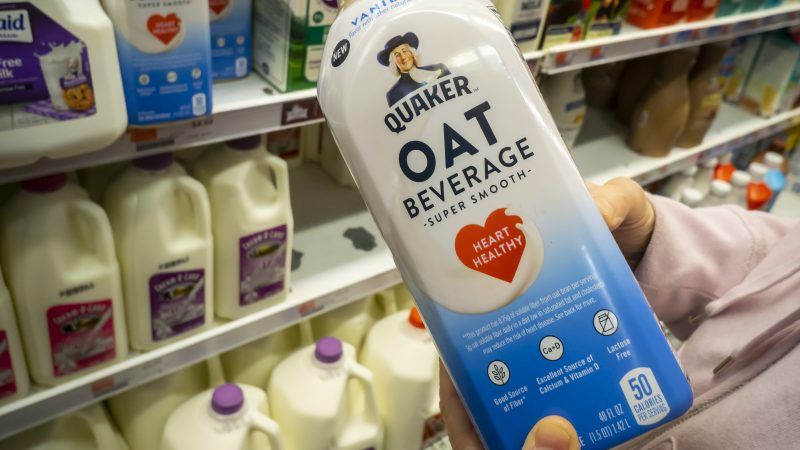Europe Considers Orwellian Proposal To Protect Its Dairy Industry From Vegan Competitors
Consumers aren't confused about where plant milks come from. Quite the opposite, in fact.

As early as this week, the European Union (E.U.) could deal a nonsensical and significant blow to makers of plant-based dairy substitutes such as almond milk and soy-based yogurt. And though several U.S. states have taken some steps to protect animal-based dairy interests, some of the E.U.'s more obnoxious efforts make those wrongheaded efforts in U.S. states look reasonable by comparison.
In 2017, a European court banned makers of plant-based milks from labeling their milk as "milk." Since then, as The Conversation explained in an excellent piece this week, the E.U. has moved to place further restrictions on plant-based dairy substitutes.
Opponents of the current E.U. proposal, Amendment 171, have dubbed it the "Dairy Ban." The law would prohibit plant-based milk producers from using words or images on their food labels that may also be used to describe or refer to animal-based dairy products.
Worse still, the rules could expand beyond simply censoring words and pictures on food packaging. It could even prohibit the use of some common food packaging itself.
"They would also be unable to use packaging designs that call to mind dairy products, such as yoghurt [containers] or milk cartons," The Conversation explains. "Even simply showing climate impact by comparing the carbon footprint of their products with dairy equivalents could become illegal."
Some of the potential consequences of the proposed E.U. ban, critics contend, could be downright Orwellian.
Amendment 171 has spurred headlines such as "Dairy Lobby Wants to Stop Vegan Brands From Using Images of Their Own Products." Oatly, the Sweden-based oat milk maker that's helping lead the charge against Amendment 171, notes the law would prohibit it and other plant-based food companies from using the phrase "does not contain milk" to describe "products that don't um…contain milk."
That would be exactly as preposterous as it sounds.
Why are E.U. lawmakers leading the charge against the powerful animal-based dairy industry's upstart plant-based competitors? Simple. Lawmakers are doing so at the behest of those same powerful animal-based dairy interests.
The dairy lobby (both in the U.S. and E.U.) claims the honest and accurate labeling, imagery, and packaging used by most plant-based competitors misleads consumers. It does not.
"No reasonable consumer would confuse soymilk or almond milk with cow's milk," an advocate for plant-based foods told me in a 2017 column I wrote on wrongheaded efforts to protect the U.S. dairy industry from plant-based competitors. "In fact, demand for plant-based milks is on the rise precisely because consumers are seeking out dairy-free options."
While plant-based meat and dairy substitutes are indeed a small-but-growing segment of the global food market, that growth has been slowed by the lawmakers who have pushed burdensome rules.
Here in the U.S., lawmakers in several states have mimicked some of the worst inclinations of lawmakers in Brussels. In 2018, Missouri became "the first state to take steps to prevent misrepresentation of products as meat that are not derived from livestock or poultry," banning vegan and vegetarian imitators from using the term "meat" to refer to their products. Since then, the National Conference of State Legislatures reports at least 10 U.S. states have adopted similar laws.
Plant-based food makers have sued to overturn some of these laws, including Missouri's. And these lawsuits often reveal the inanity of the laws they're challenging. For example, as I explained in a column last year, a federal judge in California—a state that has targeted vegan dairy companies—ruled that the "maker of a vegan butter, may use the word 'butter' to describe its, well, vegan butter."
In the United States, at least, these various state laws barring plant-based food makers from honestly describing the products they sell violate their First Amendment rights. And they violate the First Amendment rights of consumers to see, read, and be informed by those honest descriptions.
As I urged in a 2012 column, food companies should be free to use "any and all statements that aren't demonstrably false" on their product labels. Plant-based food companies are no exception.
While the rights of food companies and consumers may differ to some extent in the E.U., the same general principles apply equally there and in the U.S.: consumers are served best when the law allows companies to tell the truth about their food products. That's why the growing European crackdown on plant-based foods, which violates that principle, is so harmful and should be reversed.
